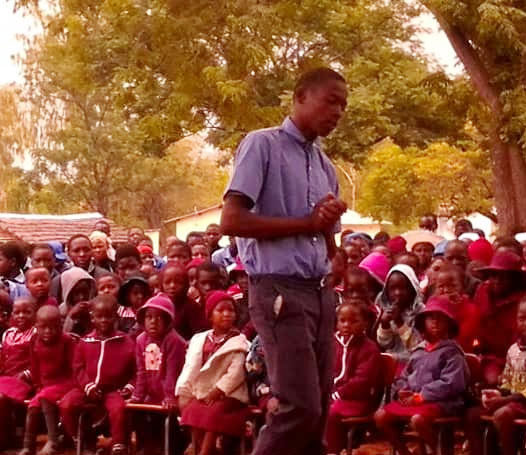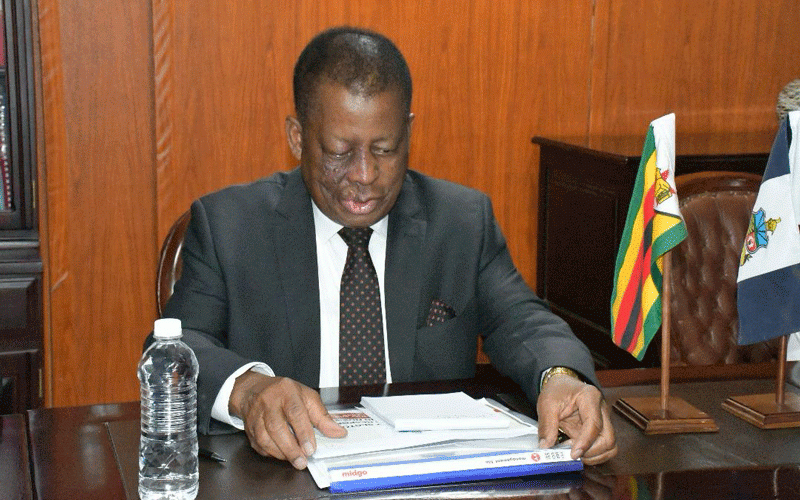
BY JAIROS SAUNYAMA
Scores of people gathered at Chikurumadziwa business centre in Wedza South for the Independence Day celebrations held a couple of weeks ago.
Traditionally, the day is characterised by feasting as villagers slaughtered three beasts while the elderly women had brewed the traditional opaque beer as part of the celebrations.
This year, it was different altogether after a 17-yer-old boy, Nicholas Nhata, spiced up the event with some scintillating poems.
Nhata, a Form 4 student at St Henry’s Chikurumadziwa Secondary School, exhibited some poetic skills such that if tapped, the future of the arts industry is bright. The boy boasts of 130 poems written over the past years, all laden with rich Shona lines and packaged in two counter books.
He has become the village poet, often called to recite poems at gatherings back in the village, a thing which he is totally against as he is confident that his poems will see him being among the class of Chirikure Chirikure, Jabulani Mzinyathi, Lazurus Sauti and Mbizo Chirasha, to mention just a few.
He wants them published and possibly recited in schools.
“I enjoy writing and reciting poems, that’s my talent. I pray that one day a sponsor will come so that they get published. Currently, I have 130 poems all in vernacular and they are in these counter books,” he said.
- Chamisa under fire over US$120K donation
- Mavhunga puts DeMbare into Chibuku quarterfinals
- Pension funds bet on Cabora Bassa oilfields
- Councils defy govt fire tender directive
Keep Reading
Some of his poems like Cyclone Idai, Nhaiwe Tuku and Musikana Wangu denote a talented rural poet whose works if recognised can match those of established names.
“I will continue writing and reciting poems. That is the talent I have, I pray that one day my dream will come true and that these poems will be read by other learners,” added Nhata.
This is not about Nhata’s predicament only, but a number of young rural poets whose promising careers have died a natural death due to lack of exposure coupled with poor government policies to tap talent into the marginalised areas.
A few years ago, government, through the Primary and Secondary Education ministry, introduced the new curriculum that encourages teachers to let learners pursue their strengths. However, the implementation of the curriculum in the rural areas is in the doldrums due to lack of commitment and unavailability of funds, thereby disadvantaging young poets like Nhata.
Lawyer-cum-poet Jabulani Mzinyathi said the Arts ministry should establish arts centres in rural areas in the long term for the benefit of talented pupils.
“In the long term, the ministry responsible for arts and culture must establish arts centres in the rural areas,” said Mzinyathi.
“Rural-based artistes must be helped to organise by the National Arts Council, fellow artistes in the urban areas should also reach out to their counterparts in rural areas and share experiences.
“Arts promoters should take time to fund artistes in the rural areas. The media is a vital tool for giving exposure to rural talent too. It is my view that with such a multi-prolonged approach, the rural-based arts sector will strike success.”
Lack of funding has dampened the spirit of many poets, especially in rural areas. In 2005, the Budding Writers’ Association of Zimbabwe recorded a CD and some of the young poets were from Mudzi. The CD went on sale, but the organisation folded at the end of 2009 due to financial constraints, thereby negatively affecting potential talents.
The coming-in of Barney Mpariwa’s project Starbrite also saw the rise of young poets from rural areas. However, there is need for more such talent-searching shows to cover the length and breadth of the country. Most auditions are held in provincial capitals, resulting in a number of talents failing to secure transport and slots.
The advent of technological advancement has resulted in most rural youths benefiting from latest ICT facilities as they join the global network. However, due to economic challenges, most youths are failing to secure latest technological gadgets as well as lack of ICT skills in marketing their products and exhibiting their talents. Moreover, the ever-increasing data tariffs are a thorn in the flesh for those in possession of latest internet gadgets.
Award-winning journalist-cum-poet Tinashe Muchuri said talented rural artistes should make use of technology to gain exposure. He, however, bemoaned the unavailability of funding towards searching for talent in marginalised areas.
“There are many ways of capturing such talents. The first is to establish an online platform through which their talents can be exposed,” Muchuri said.
“There is need to secure a sponsor who is willing to facilitate the convergence of these new talents into being established.
“These poets in the rural areas should embrace competitions or online journals through which they can establish their names giving people a taste of their pudding. For example, there is an online journal called Munyori that appreciates talent from all over the country. Technology is the way to go.”
Some of the poets who have benefited through publishing content on social media platforms include Abel Mauchi from Gutu, who is now making a living through reciting poems at corporate events.
Another example is Linda Gabriel, whose poems appeared later in books after a long romance with social media platforms.
Most of the poems in the book Dzinonyandura Svinga Renduri were retrieved from a Facebook page called 263 Nhetembo. The book was a nominee at the 16th edition of the National Arts Merit Awards as well as an Advanced Level set book.
For now, Nhata can remain a village champion despite his abilities to influence literature in the country. The lack of implementation will by relevant authorities has been a hindering factor to the success of many poets and other artistes.
Today, bubbling with two counter books laden with poems, Nhata is not going to rest anytime soon. If he goes unrecognised in the next five years, he might be sitting on thousands of scintillating and informative poems.











